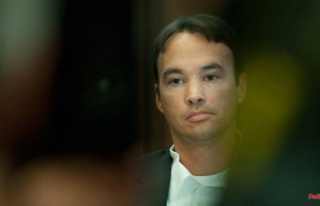Epidemiologists are observing the impact of the Munich Oktoberfest on the pandemic very closely. With ongoing investigations of the waste water from the Wiesn, they want to determine whether there are any major outbreaks. So far this has not been the case, but it is too early for a final verdict.
Munich scientists are constantly examining the wastewater from the Oktoberfest for components of the corona virus. There is currently a virus concentration there that is similar to that in the city, said Andreas Wieser from the Department of Infection and Tropical Medicine at the LMU Klinikum in Munich. For the duration of the festival, samples would be taken daily from the wastewater before and after the Wiesn.
"We can already see that something is going on there," said the head of the Sars-CoV-2 laboratory. However, it is not yet possible to tell from the waste water whether a Wiesn wave is already looming. "We can't make any statements on that yet," said Wieser. "We have an incubation period of five days. It is not to be expected that large jumps will be seen there."
In addition, the wastewater from the Wiesn is very diluted compared to other urban wastewater - that could affect the result. The reason for the different concentration is a lot of flushing water and a predominant release of urine - and not stool. The heavy rain a few days ago also made it difficult to determine concrete values.
The fact that it was at all possible to detect the virus specifically in the heavily diluted sewage from the folk festival is a good sign for the method itself. Such a test at a large folk festival like the Wiesn has not yet taken place.
The evaluation of the results is also made more difficult by the fact that the Wiesn guests are traveling all over Munich. "Most of the guests are also in hotels or live in Munich or the surrounding area, so that they can also introduce viruses into the water here as cases of infection. That's why we also monitor the city's wastewater for comparison." In addition to the viral load, the scientists also carried out sequencing in order to observe the genetic composition of the viruses - and also to quickly discover possible new variants.
Bavaria's Minister of Health Klaus Holetschek said that the development of the corona virus was also being closely monitored in connection with the Oktoberfest. Wastewater monitoring is another approach to gaining knowledge about this. With the Oktoberfest, an increase in the number of infections in Munich is to be expected.
"The situation in the hospitals is and remains crucial." There are already staff shortages there, but these can still be largely compensated for. According to previous experience, it takes one and a half to two weeks after the start of a folk festival for any waves of infection to show up in the incidence. The Wiesn has been running for about a week.












